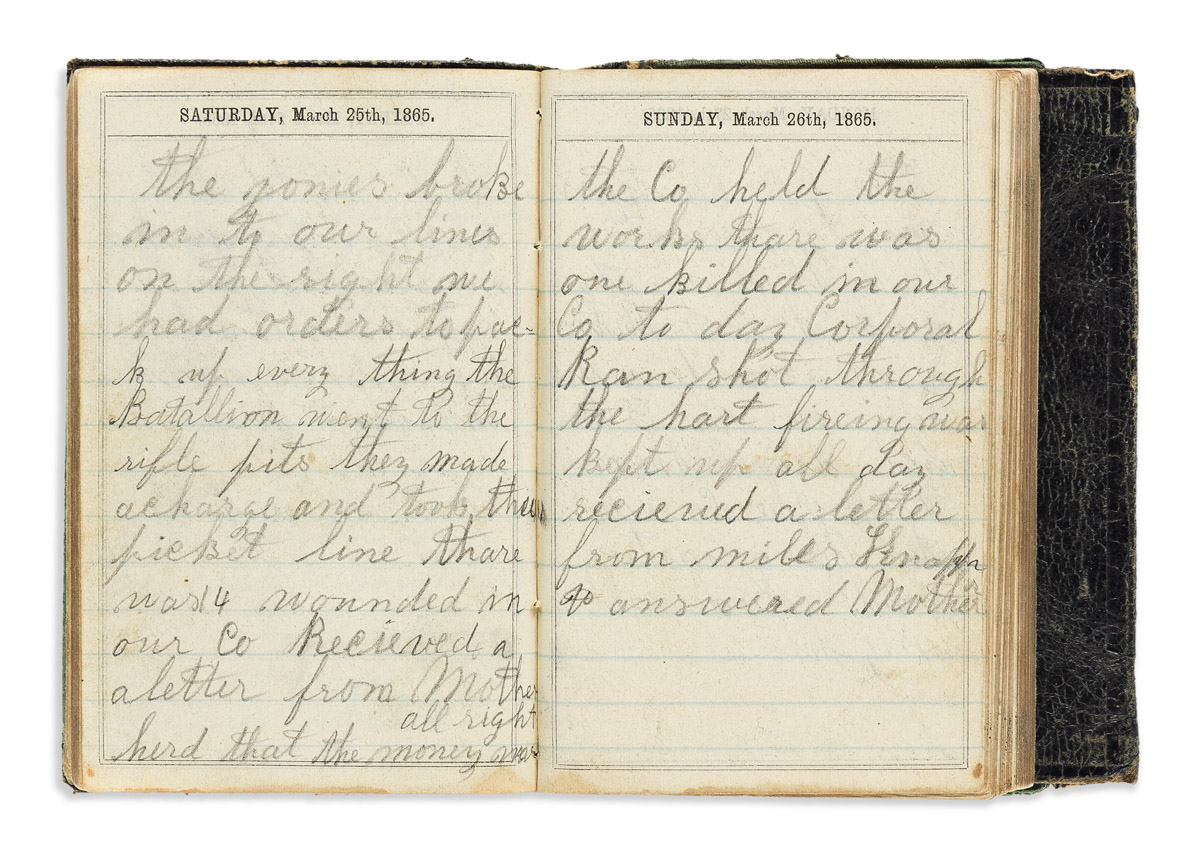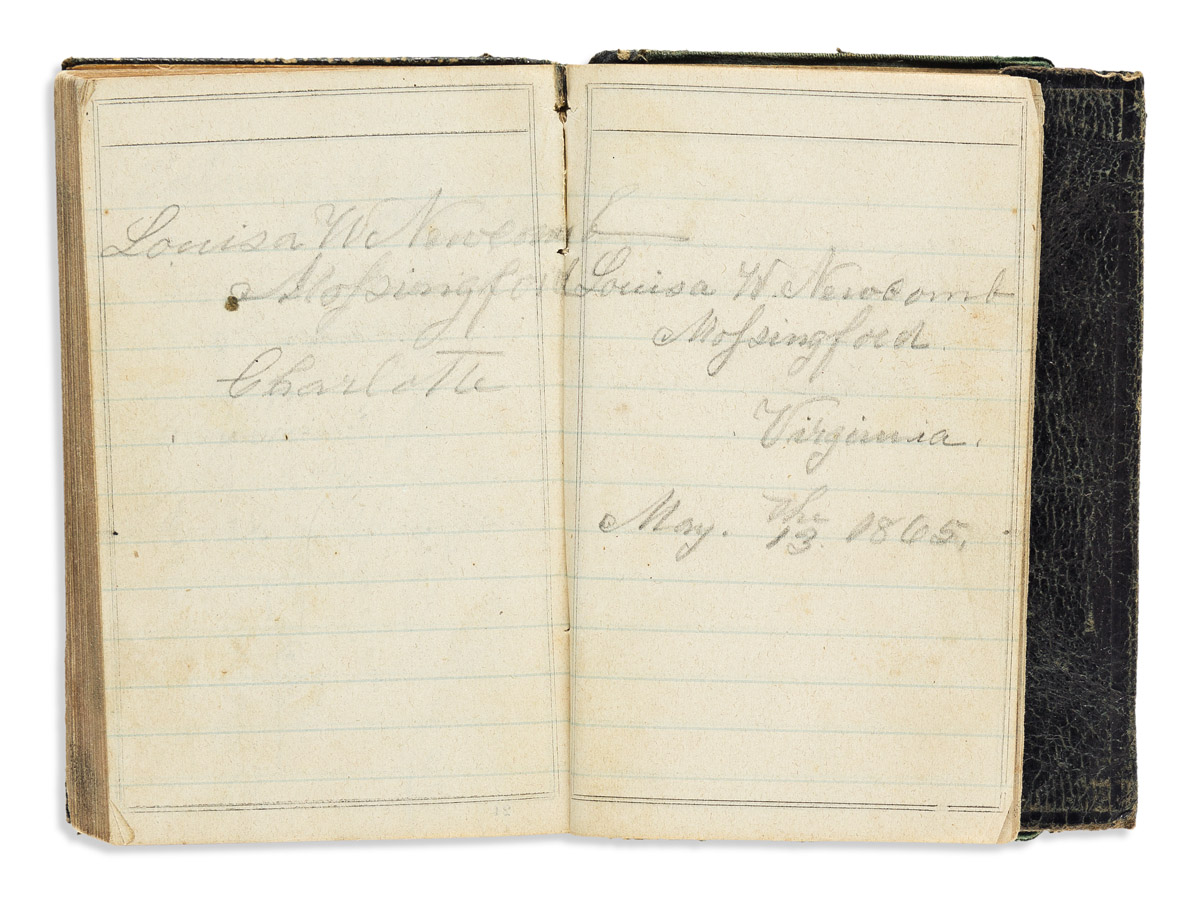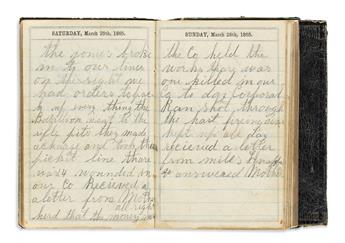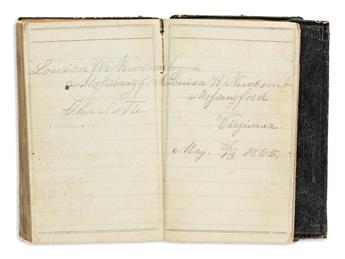Sale 2600 - Lot 86
Price Realized: $ 950
Price Realized: $ 1,188
?Final Price Realized includes Buyer’s Premium added to Hammer Price
Estimate: $ 600 - $ 900
(CIVIL WAR--NEW YORK.) Leroy P. Deuel. A small-town private helps defeat Lee, and finds the love of his life. 278 manuscript diary pages plus 13 pages of memoranda, in pre-printed "Clayton's Pocket Diary." 16mo, 4 x 2 1/2 inches, original limp calf, minor wear; contents sometimes faint but legible, with minimal wear; signed with regiment on front free endpaper, explaining that the diary was bought on 14 March 1865 (with the earliest entries presumably transcribed from notes). Various places, 1 January to 5 October 1865
Additional Details
This humble diary traces the Siege of Petersburg and the Appomattox Campaign--and an unlikely love story. Leroy P. Deuel (1845-1927) was from Marion, NY, not far east of Rochester. He served as a private in the 9th New York Heavy Artillery, which mainly functioned as an infantry unit and saw heavy fighting though 1864 in the Overland and Shenandoah Valley campaigns. This diary opens with the Siege of Petersburg underway. On New Year's Day, he was on picket when "two Jonies come in to our lines and give themselves up. . . . Went to Core headquarters with them." The next day "the Jonies made a raid on our picket pine, killed two & captured 23 of our boys & a good many knapsacks and blankets." On 7 February he reported that "5 p.m. Rebs made a charge on our line near Hatcher's Run but were repulsed." His regiment was reviewed by General Meade on 7 March, and on the 11th he witnessed the execution of deserter James Kelley of the 67th Pennsylvania. On 23 March he wrote "A Lincoln was here today. The 2 Corps had a review."
On 25 March, Deuel reported on the Battle of Fort Stedman, a desperate Confederate attempt to break the siege: "The Jonies broke in to our lines on the right. We had orders to pack up every thing. The Battalion went to the rifle pits. They made a charge and took the picket line. Thare was 14 wounded in our Co." The next day, one of his company's corporals was shot through the heart. Fort Stedman cleared the way for the events of 2 and 3 April which broke the back of the Confederacy: "Charged the enemy's works, carrying them, & capturing many pieces of art'y & many prisoners, driving the enemy for some distance. . . . Richmond was entered this morning by our troops 1/2 8 a.m." In the ensuing Appomattox campaign on 6 April, "drove the Jonies, captured old Lea's son [General George Washington Custis Lee], Battle of Sailor's Creek," and finally on 9 April "Gen. Lea surenderd his army today at 5 p.m. Thare was grate rejoicing in camp." As in countless other diaries from this month, the rejoicing was short-lived. On 18 April, "the news reached here that the Presedent was dead. It is tough."
From that point onward, camp life was sleepy. Most notably, on 10 May he wrote "Went to arest a Negro this evening. Got aquainted with a girl by the name of Louisa Nucom." Then on 18 May he decided to be more discreet: "Went into the contry to see the girls, had a fine time with J.W.G., L.W.N." In the back of the volume, his sweetheart Louisa W. Newcomb of Mossingford, VA signs three times, adding "May ever blessing be thy lot, I only ask, Forget me not." Deuel did not muster out of service until 29 September, and the diary ends on 5 October with his arrival in Manhattan and a speech by Governor Reuben Fenton.
Deuel spent the rest of his long life as a farmer in his hometown of Marion. In 1869, he married Louisa Newcomb (1844-1925)--the girl he met on garrison duty back in Virginia. They remained married for 56 years and raised two children.
The war diary is accompanied by two later diaries of similar size written in Marion in 1867: one by Leroy, and one by Leroy's mother Nancy Keeler Deuel (1819-1896). Mother Deuel was a better-than-average chronicler of small-town life. Also included is a worn and incomplete 1835 printing of Union Hymns in the same size.
On 25 March, Deuel reported on the Battle of Fort Stedman, a desperate Confederate attempt to break the siege: "The Jonies broke in to our lines on the right. We had orders to pack up every thing. The Battalion went to the rifle pits. They made a charge and took the picket line. Thare was 14 wounded in our Co." The next day, one of his company's corporals was shot through the heart. Fort Stedman cleared the way for the events of 2 and 3 April which broke the back of the Confederacy: "Charged the enemy's works, carrying them, & capturing many pieces of art'y & many prisoners, driving the enemy for some distance. . . . Richmond was entered this morning by our troops 1/2 8 a.m." In the ensuing Appomattox campaign on 6 April, "drove the Jonies, captured old Lea's son [General George Washington Custis Lee], Battle of Sailor's Creek," and finally on 9 April "Gen. Lea surenderd his army today at 5 p.m. Thare was grate rejoicing in camp." As in countless other diaries from this month, the rejoicing was short-lived. On 18 April, "the news reached here that the Presedent was dead. It is tough."
From that point onward, camp life was sleepy. Most notably, on 10 May he wrote "Went to arest a Negro this evening. Got aquainted with a girl by the name of Louisa Nucom." Then on 18 May he decided to be more discreet: "Went into the contry to see the girls, had a fine time with J.W.G., L.W.N." In the back of the volume, his sweetheart Louisa W. Newcomb of Mossingford, VA signs three times, adding "May ever blessing be thy lot, I only ask, Forget me not." Deuel did not muster out of service until 29 September, and the diary ends on 5 October with his arrival in Manhattan and a speech by Governor Reuben Fenton.
Deuel spent the rest of his long life as a farmer in his hometown of Marion. In 1869, he married Louisa Newcomb (1844-1925)--the girl he met on garrison duty back in Virginia. They remained married for 56 years and raised two children.
The war diary is accompanied by two later diaries of similar size written in Marion in 1867: one by Leroy, and one by Leroy's mother Nancy Keeler Deuel (1819-1896). Mother Deuel was a better-than-average chronicler of small-town life. Also included is a worn and incomplete 1835 printing of Union Hymns in the same size.
Exhibition Hours
Exhibition Hours
Aliquam vulputate ornare congue. Vestibulum maximus, libero in placerat faucibus, risus nisl molestie massa, ut maximus metus lectus vel lorem.






